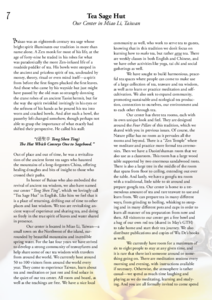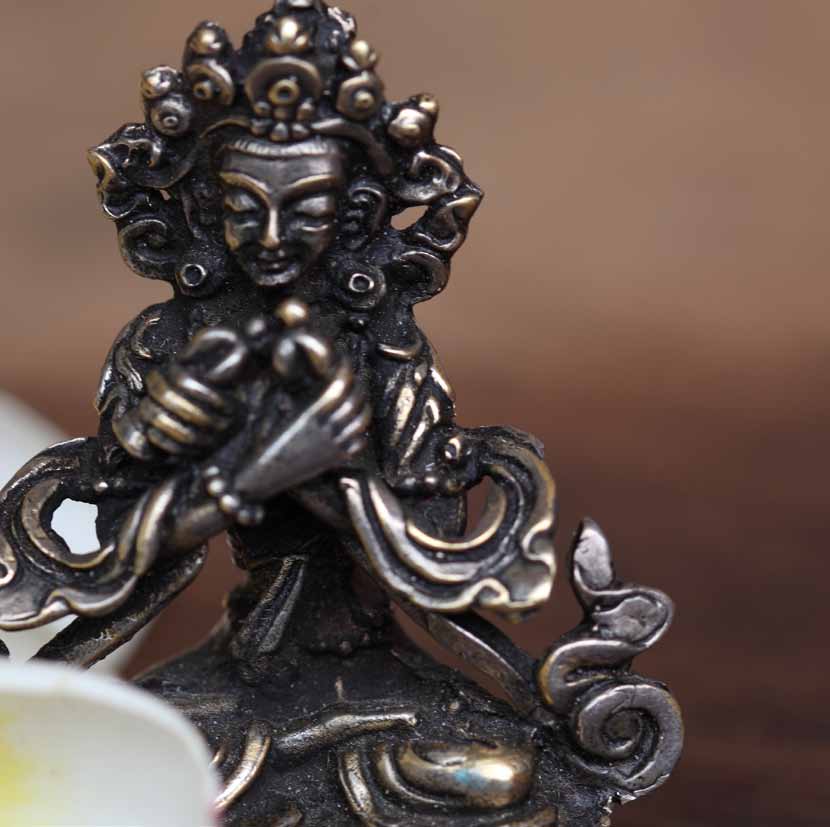
 |
|
Baisao was an eighteenth century tea sage whose bright spirit illuminates our tradition in more than name alone. A Zen monk for most of his life, at the age of forty-nine he traded in his robes for what was paradoxically the more Zen-infused life of a roadside peddler of tea. His bowls were steeped in the ancient and priceless spirit of tea, unclouded by money, theory, ritual or even mind itself - a spirit from before the first fingers plucked the first leaves. And those who came by his wayside hut just might have passed by the old man so strangely donning the crane robes of an ancient Taoist hermit, but for the way the spirit twinkled invitingly in his eyes or the softness of his hands as he poured his tea into worn and cracked bowls. And after such a bowl, the passerby left changed somehow, though perhaps not able to grasp the importance of what exactly had shifted their perspective. He called his stall:
"(通聖亭 Tong Shen Ting) The Hut Which Conveys One to Sagehood."
Out of place and out of time, he was a revitalization of the ancient forest tea sages who haunted the mountains of a long-forgotten China, offering healing draughts and bits of insight to those who crossed their paths.
In honor of Baisao who also embodied the revival of ancient tea wisdom, we also have named our center "Tong Shen Ting", which we lovingly call "Tea Sage Hut" in English. Like him we feel that it is a place of returning, drifting out of time to other places and lost wisdom. We too are revitalizing ancient ways of experience and sharing tea, and doing so freely in the true spirit of leaves and water shared in presence.
Our center is located in Miao Li, Taiwan - a small town on the Northwest of the island, surrounded by beautiful mountains and incredible spring water. For the last four years we have strived to develop a strong community of teawayfarers and help share some of our tea wisdom with travelers from around the world. We currently host around 50 to 100 visitors from around the world every year. They come to experience Taiwan, learn about tea and meditation or just rest and find solace in the quiet of our tea center. All room and board, as well as the teachings are free. We have a nice local community as well, who work to serve tea to guests, knowing that in this tradition we don't focus on learning how to make tea, but rather serve tea. There are weekly classes in both English and Chinese, and we have other activities like yoga, tai chi and social gatherings as well.
We have sought to build harmonious, peaceful tea spaces where people can come to make use of a large collection of tea, teaware and tea wisdom, as well as to learn or practice meditation and selfcultivation. We also seek to expand community, promoting sustainable and ecological tea production, connection to ourselves, our environment and to each other through tea.

Our center has three tea rooms, each with its own unique look and feel. They are designed around the Four Pillars of this tradition, which we shared with you in previous issues. Of course, the Nature pillar has no room as it pervades all the rooms and beyond. There is a "Zen Temple" where we meditate and practice more formal tea ceremonies. Then we have a Daoist/shaman room that we also use as a classroom. This room has a large wood table supported by two enormous sandalwood roots. There is also a large tree in the middle of the room that spans from floor to ceiling, extending out over the table. And lastly, we have a gongfu tea room with a traditional, little table to sit around and prepare gongfu tea. Our center is home to a tremendous amount of tea and rare teaware to use and learn from. We can prepare tea in many different ways, from grinding to boiling, whisking to steeping and in many different pots and cups in order to learn all manner of tea preparation from now and then. All visitors to our center get a free bowl and a bag of our own red tea (shared in May's GTH) to take home and start their tea journey. We also distribute publications and copies of Wu De's books as well.
We currently have room for a maximum of six to eight people to stay at any given time, and it is rare that there isn't someone around or something going on. There are meditation sessions every morning and evening, with instructions available if necessary. Otherwise, the atmosphere is rather casual - we spend as much time laughing and playing as we do meditating, learning and studying. And you are all formally invited to come spendsome time laughing and drinking cup after cup, bowl after bowl with us. Every day we put out a cup on one of the altars for all of you - all our brothers and sisters around the world - so that you'll always know a steaming cup awaits you here. Should you find yourself having a bad day, know that such a cup is truly here waiting. And should you find yourself Eastward bound, know that you have a home here.
"It was a hot summer day when I entered the gate strewn with Plumeria flowers... The atmosphere behind the gate was so different from the hustle and bustle of the city: it is actually a hut, deep in the mountains, where an old bearded monk has just put on a kettle of mountain spring water - its steam interrupting a deeper silence. I was received very warmly and spent two days in the center, meditating on each sip of pure and natural tea. It was a breath of calm joy and spirituality that was blown back into my heart, and which I am still carrying with reverence. Though I left the center after some time, the center is still inside of me."
"Meeting people at the center was very much a chance encounter for me. I didn't know much about tea, yet was open and receptive to their teachings. I was struck in really seeing the ways that something as simple as tea can bring a deeper joy, a greater love, and a better understanding of life. To many, tea just is a beverage to drink and not a path to any specific kind of greater understanding. Yet, in its simplicity, its ordinariness, one can begin to look deeper to see how the extraordinary can be found in the simplest of things. In journeying for the short while that I have with tea I have been given the privilege to truly live ideals I simply believed in, and I've been able to meet people who have used their lives to grow in a better understanding of these same ideals. The mindful practice of Cha Dao has in it a very rich tradition of helping those of us who seek true peace, calm joy, and loving kindness. It is because of this living tradition that tea isn't a simple beverage. Neither is it some gateway to a mystical experience. To me, tea is a way to learn how to find real, every-day beauty and grow ourselves in it. In practical terms, one might look at the situation and say that encountering those at the center and encountering tea changed my life, but this is not true; life changed on its own. Those friends I met and experiences I had only helped me see the change more clearly."
"Here is tea returned to its most potent minimum: good water and good leaves sought in kind company. Such is a place where conversations needn't be anything but natural, honest, and steeped in the mutual love of the Leaf. To be here, finding ourselves so privileged, it is tempting to get lost in long discussions, but you innately know that the wisdom of this place creeps in stillness, stillness found at the bottom of your tea bowl. And once you get there you may discover that your relationship with leaves, water, people and all the rest else has changed."
"My stay at the tea school was a great experience. It was a joy to meet with the other students, who were wonderful people. We drank many delicious teas, all grown in natural and organic methods, using a variety of teaware that complemented both the tea and people alike. There were many opportunities to learn and ask questions, and equally many to put intellectual matters aside and enjoy the tea and surroundings in comfortable quiet."
"Although at the moment there is only enough room for passing guests, the Center is my home as much as if not more than the place where I do sleep each night. It is where I drink most of my tea, spend time with loved ones, laugh, cry, struggle, triumph, and transform. It is a place where every particle of the building is highly tuned to the language of tea, almost as though the tables and floors are even straining their ears to hear what it has to say. It's a place for wisdom and community, a place of love and light where everything has the space it needs to be cultivated and grow."